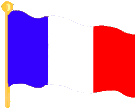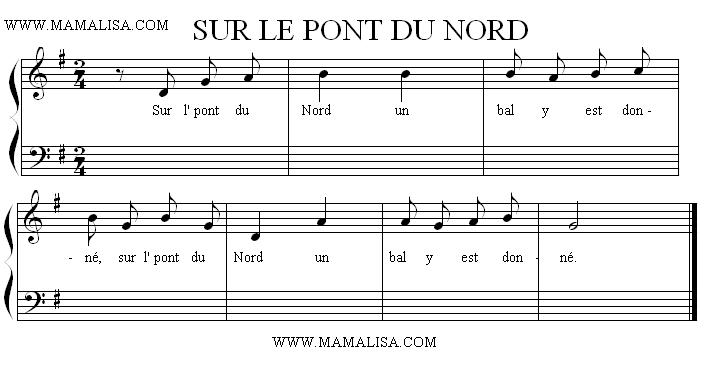Sur le pont du Nord
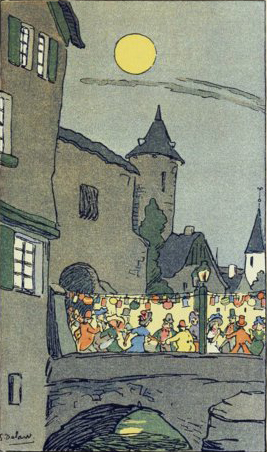
Sur le pont du Nord
On the North Bridge
Chanson enfantine
Children's Song
(French)
(English)
Sur le pont du Nord un bal y est donné
Sur le pont du Nord un bal y est donné
Adèle demande à sa mère d'y aller
Adèle demande à sa mère d'y aller
"Non, non ma fille tu n'iras pas danser"
"Non, non ma fille tu n'iras pas danser"
Monte à sa chambre et se met à pleurer
Monte à sa chambre et se met à pleurer
Son frère arrive dans son bateau doré
Son frère arrive dans son bateau doré
"Ma sœur, ma sœur qu'as-tu donc à pleurer"
"Ma sœur, ma sœur qu'as-tu donc à pleurer"
"Maman n' veut pas que j'aille au bal danser"
"Maman n' veut pas que j'aille au bal danser"
"Mets ta robe blanche et ta ceinture dorée"
"Mets ta robe blanche et ta ceinture dorée"
Le pont s'écroule et les voilà noyés
Le pont s'écroule et les voilà noyés
Voilà le sort des enfants obstinés
Voilà le sort des enfants obstinés.
On the North Bridge a dance is given.
On the North Bridge a dance is given.
Adele asks her mother if she can go to it.
Adele asks her mother if she can go to it.
"No, no, my daughter, you will not go to dance."
"No, no, my daughter, you will not go to dance."
She goes up to her room and starts to cry.
She goes up to her room and starts to cry.
Her brother arrives in his golden boat.
Her brother arrives in his golden boat.
"Sister, sister, what are you crying about?"
"Sister, sister, what are you crying about?"
"Mommy doesn't want me to go to the dance."
"Mommy doesn't want me to go to the dance."
"Put on your white dress and your golden belt."
"Put on your white dress and your golden belt."
The bridges collapses and they drowned.
The bridges collapses and they drowned.
See the fate of obstinate children.
See the fate of obstinate children.
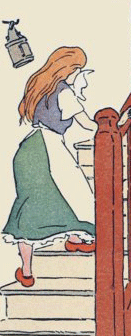
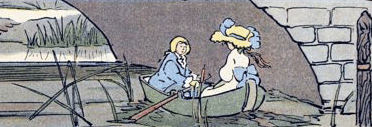
Comments
Monique sent alternate versions of this song:
"Some versions have it as the Nantes Bridge (le pont de Nantes) instead of the North Bridge. The Nantes Bridge is in the French city of Nantes at the mouth of the Loire River.
Some versions have the girl's name as 'Hélène' (Helen) instead of 'Adèle' (Adele), and the second line as, 'La belle Hélène voudrait bien y aller' (The beautiful Helen wanted to go to it).
Some versions have the lines below before the last line. This is the version I learned as a child:
Toutes les cloches se mirent à sonner
(All the bells started ringing)
La mère demande 'Qu'a-t-on à tant sonner ?' ou 'ce qu'elles ont à sonner'
(The mother asks, 'Why do they ring the bells so much?' or 'For whom do they ring?')
'C'est pour Hélène et votre fils aîné'
(It's for Helen and your eldest son.)"


Thanks!
Thanks and Acknowledgements
Translation: Monique Palomares and Lisa Yannucci.
Images from "Gai, gai, marions-nous" by Gabriel Pierné.
Merci beaucoup!


